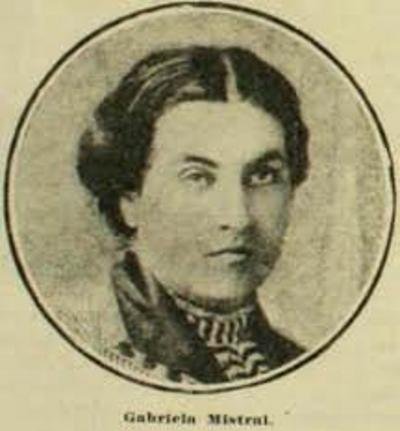
THE LOVELESSNESS IN POETRY (PART II)

In the previous issue, See here, we talked about how literature has been responsible for writing about the love and passion not only of literary characters, but also of writers, throughout history. In the same way, writing has also served to express the sadness or lack of affection of the man in love. This feeling of rejection on the part of the loved one can trigger a series of negative behaviours and feelings in the human being. One of these feelings is jealousy.
The French writer Francois de la Rochefoucauld said: "Jealousy is born of love, but it does not die with it” . On the contrary, it can intensify them. The fact that one person has been rejected by another can create a state of anguish, expectation and uncertainty, and if you see your loved one with another, these feelings may increase. Let's look at two examples:

In the poem"Balada," by Chilean writer Gabriela Mistral, we see how the female voice anxiously observes her man's passage with a new woman. Here I transcribe the first two stanzas:
It happened with another woman;
I saw it pass by.
The wind is always sweet
and the way in peace.
And these miserable eyes
they saw what happened!
In this first part, the lyrical voice not only speaks of her walk with another woman, but has seen it and speaks of the landscape that surrounds the couple, which by its description seems idyllic and full of joy. The atmosphere of the couple is placid, but when she refers to herself, she speaks of the eyes (with which she looks at the couple) and describes them as unfortunate and unhappy. In the second stanza he maintains the same pitiful tone:
Loves another woman
through the blossoming earth.
He has opened the thorn;
a song continues.
And he loves another woman
through the earth in bloom!
Already in this stanza it is not simply to see the beloved pass with another person, it is also how he loves her. And when we refer to the thorn, we observe that there is a suggestion to the wound that opens the lack of love and produces pain.

In the same way, we can perceive, in the poem "Así, verte de lejos" by the Cuban writer José Ángel Buesa, the same unpleasant feeling of seeing a loved one with another. Experience, as we said before, causes jealousy in the subject in love:
So, to see you from afar, definitely.
You go with another man and I go with another woman.
And yes, like water flowing from a fountain
Those beautiful days can no longer return.

In this first stanza, two interesting ideas stand out: the lyrical voice tells us that they are no longer alone, but that new couples exist, and that there is the conviction that they cannot love each other again. Moreover, this past love and the impossibility of proving it is ratified in the second stanza of the poem:
Thus, to see you from afar and to pass smiling,
like someone who no longer feels what he felt yesterday,
and make my face indifferent
and that the gesture of boredom seems a pleasure.
It must be borne in mind that the subject in love, after the breakup, knows that although he feels repentant and jealous of seeing the loved one with the other, he can not publicly demonstrate these feelings, sometimes out of pride, sometimes because inside has accepted that the love of the other person no longer belongs to him.

If there is something that the subject in love feels has been hurt by the lack of affection, it is precisely his heart and his pride. In his "wound healing" process, he begins to reconstruct these two things that have been wounded. For example, as for her pride, she feels a great narcissistic wound from the other person's lack of love. Ana Teresa Torres, a Venezuelan psychologist, says that "the restoration of self-esteem is given through the feeling of being superior through the exaltation of her feeling of love"; that is, the fact of loving without having been loved, or of loving more than the other person, makes her assume a superior attitude towards the other. Ernesto Cardenal's next poem, Epigrama, is a living example of what we point out here:
When I lost you, you and I lost:
Me, because you were what I loved the most
And you because I was the one who loved you the most.
But of the two, you lose more than I do:
For I will be able to love others as I have loved you,
But they won't love you like I loved you.

We see how in the last verse, the lyrical voice affirms the impossibility of the person being loved as he has been. One of the most famous poems of the Spanish poet Gustavo Adolfo Bécquer, "Volverán las oscuras golondrinas", is in the same tone. Here I leave you the last two stanzas:
They will come back from love in your ears
the fiery words that sound,
your heart from its deep sleep
maybe she'll wake up.
But mute and absorbed and kneeling
as one worships God before his altar,
as I have loved you..., get rid of yourself,
They won't want you!
The lyrical voice accepts that the other can fall in love again, but decrees that he will not be able to find a love similar to his love, and in that sense makes his love superior to any other. In fact, he gives it a religious character and in this way glorifies and distinguishes it.

Let us bring one last poem to exemplify perhaps fulfillment, renunciation, but also the hope of a new love. The following poem is by the Venezuelan writer Andrés Mata and is entitled "Música triste" (Sad Music). Let's look at the first and last part:
A love that goes away? How many have left!
Another love will come more lasting
and less painful than oblivion.
…
A love that goes away? How many are gone!
Can the last love be the first!
The first verse is very significant! Because to the question that is asked, there is an answer that contains not only an affirmation, but the possibility that in life there will be more farewells and disaffections, which is not the only time you can experience this feeling of disillusionment. In the first stanza, the lyrical voice tells us that one love is gone, but there is hope not only that another will return, but that it will be better than the previous one. This poem culminates perhaps with one of the greatest certainties that man has: every end is a beginning. In the matter of love, perhaps what begins could be better than what is finished.

BIBLIOGRAPHICAL REFERENCES
Ana Teresa Torres (1993). El amor como síntoma. Editorial Psicoanalítica: Venezuela.
Rafael Arráiz Lucca (2006). El libro del amor: poesía amorosa universal. Alfadil:
Venezuela.
http://dispoetica.com/poesia/ernesto-cardenal-epigramas-claudia/
http://www.gabrielamistral.uchile.cl/poesia/desolacion/dolor/balada.html
https://poemas.yavendras.com/de-desamor.php
https://psicologiaymente.com/pareja/etapas-del-desamor
https://psicologiaymente.com/pareja/fases-superar-duelo-ruptura-pareja
https://verbiclara.wordpress.com/2014/11/18/musica-triste-poema-de-andres-mata/
http://www.gavilan.edu/disted/html/4_14.html
http://www.redalyc.org/pdf/402/40290102.pdf
http://www.poesi.as/Jose_Angel_Buesa.htm
Written by: @nancybriti
Click on the coin to join our Discord Chat

Witness proposal is here:
Go To Steem Witness Page
In the bottom of the page type: adsactly-witness and press vote.

Use small letters and no "@" sign. Or, click here to vote directly!
Thank you!
Wow 😳
very very wonderful art
Thank you for commenting.
Love is very important part in life. Its is every relationship. Be it with father, mother, sister or friends etc. Does not matter the type of relationship but what matters is that it is Beautiful.
Posted using Partiko Android
That's right, @alokkumar121. Love is beautiful!
Great words.. We need an endless and unfailing love... Let love lead
Love can be a good compass, @lilkeszi. Thank you for commenting.
genial este post
Gracias por tu comentario.
It really pains to see a loved one loving another person. @adsactly i have missed your writeups. But i must appreciate this poem which i met. Love is a good thing.
Seeing a loved one with another can create a feeling of pain and loss. Love, if reciprocated, is good. Greetings
Impressive it is. This write up made me to remember when I was still studying in university. I made series of research on Modern poetry.
Your write up is great!
It's a good thing this job reminded you of your student moments. It's always good to remember what's good. Thank you for commenting!
Thanks for your sweet message!
Marvelous post Nancy. Your research and thought are simply amazing.
Bravo. This is truly good work.
aqui mi visita revisando su blog,saludos desde venezuela